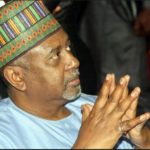Media mogul, Chief Raymond Dokpesi, and his Daar Investment and Holdings Company Limited, told the Federal High Court in Abuja on Friday that they are not the launderer of the N2.1bn as alleged in their ongoing trial; but the former National Security Adviser, Col. Sambo Dasuki (retd), who paid the funds to them in 2015.
They spoke through their lawyer, Chief Kanu Agabi (SAN), while arguing their no-case submission which they filed after the Economic and Financial Crimes Commission closed case against them with the 14th prosecution witness on May 28, 2018.
The EFCC had charged Dokpesi and Daar Investment with money laundering and procurement fraud involving the sum of N2.1bn, which they allegedly received from the Office of the National Security Adviser between January and March 2015.
Dokpesi and Daar Investment (the parent company of AIT and Raypower FM) were said to have received the sum of N2.1bn from NSA office, while being headed by Col. Sambo Dasuki (retd.) as payment for a “purported contract on presidential media initiative.”
The prosecution alleged that Dokpesi and his firm received the sum of N2.1bn from ONSA to prosecute the Peoples Democratic Party’s 2015 presidential media campaign.
The prosecution also alleged that the payment was in breach of the provisions of the Public Procurement Act, Money Laundering (Prohibition) Act and the EFCC (Establishment) Act.
But arguing his clients’ no-case submission on Friday, Agabi urged the judge, Justice John Tsoho, to dismiss the case and discharge his clients.
Agabi contended that the prosecution failed to prove any prima facie case warranting his clients to give an answer to any of the six counts instituted against them by the EFCC.
He argued that the charges were defective, as they allegedly failed to disclose the ingredients of money laundering against his clients and were “riddled with inconsistencies from the head to the toes.”
While EFCC’s prosecutor, Mr. Oluwaleke Atolagbe, opposed the no-case submission insisting that the submission by the defence was an admission to have committed the alleged crimes, Agabi maintained that the prosecution failed to call vital witnesses such as Dasuki or former President Goodluck Jonathan whom he said his client (Dokpesi) implicated in his statement.
Agabi said, “The money was paid by Col. Dasuki. His name is mentioned in the four counts of money laundering as the one who made the payment. Therefore, he is the one alleged to be laundering the funds.
“The money in counts one to four is not being laundered by the defendant. The launderer is Col. Dasuki. So, if the launderer is Col. Dasuki, are we going to convict him in absentia? We cannot convict him while he’s absent.
“Why is he not charged? His name is mentioned again and again in the charges. Even if they are not going to charge him, they should have called him as a witness because it is his action that is in question here.”
Responding, the prosecuting counsel said all the ingredients of the alleged offences were proved by the prosecution and all the necessary witnesses needed to prove the case were called.
Atolagbe said the defence’s line of argument involving Dasuki’s roles was an admission that they committed the alleged crimes.
On Agabi’s allegation of contradictions and inconsistencies in the charges, Atolagbe said, “That cannot also stand, because money obtained in the violation of Public Procurement Act as admitted by the defendant certainly cannot be legitimate.”
He urged the court “to direct the defendants to enter their defence” so that they would call witnesses such as Dasuki and Jonathan, that they felt the prosecution failed to call.
Justice Tsoho fixed November 12 for ruling.



